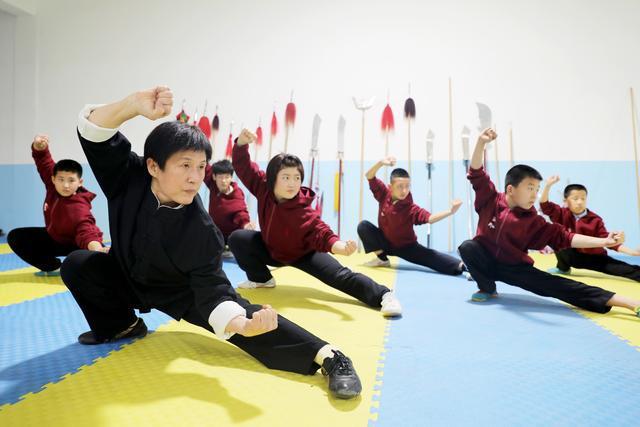Female martial artist devotes decades to passing on intangible cultural heritage
A female martial artist in north China’s Hebei Province has dedicated herself to passing on “Chuojiao,” a traditional Chinese form of martial arts that is considered an item of national intangible cultural heritage, having spent multiple decades to achieve this end.

Photo shows Miao Xiaolan and her students in a training session on May 9, 2022. (Photo/Liu Julei)
Miao Xiaolan, now 62 years old, is a sixth-generation inheritor of Chuojiao in Suning county, Cangzhou city, Hebei. With her excellent skills, Miao won several national championships at the turn of the millennium starting in 2000 and then went on to claim two gold medals at the first World Traditional Wushu Championships in 2004.
Miao started to learn a kind of Chinese-style boxing from a senior boxer in her neighboring village when she was 9. She later was enrolled at a sports school in Cangzhou city, where she learnt “Changquan,” or long-fist boxing. In 1991, Miao began to learn Chuojiao, which originated in the Song Dynasty (960-1279).
“As Chuojiao comprises fast and powerful fist and feet routines, many senior martial artists thought that it was not for women. But I had a thing for it and wanted to break away with obsolete perceptions,” Miao said.
Miao then served as a coach at a martial arts school in Suning county and began to accept apprentices at her home in her village after work. But she exempted three categories of students from any fees, namely those coming from poor families, earnest and diligent students, and aspiring students who made rapid progress.
In 1999, Miao opened her own martial arts school to teach Chuojiao. Since then, Miao’s martial arts school has cultivated about 10,000 students, including some who furthered their studies at universities, and some who became martial arts coaches themselves or otherwise found decent jobs. For example, Jiang Fangfang, one of Miao’s students, claimed a world championship and was later enrolled at Beijing Sport University, while Ha Mingkun, who learnt martial arts from Miao when he was young, is now an official at the bureau of culture, broadcast-TV and tourism of Suning county.
After Chuojiao was listed as a national intangible cultural heritage in 2014, institutions across China invited Miao to serve as their martial arts coach or counselor and offered a high salary. However, Miao refused such invitations in the end.
“I can devote more time and energy to inheriting and passing on Chuojiao while helping my students in my county,” Miao said.
Photos
Related Stories
- Inheritor of Wuxing Tongbiquan steadfast in effort to carry on traditional martial art
- Chinese Martial Arts competition held in Cotonou, Benin
- Feature: Chinese martial arts flourish in Ethiopia
- People practice Chinese martial arts Kungfu in Rafah
- Shaolin monks practice martial arts at Pagoda Forest of Shaolin Temple in Henan
- Nigerien student becomes "top martial artist" in China
- Young Botswanan shares benefit of Chinese martial arts culture
- Palestinian girls practice Chinese martial arts in West Bank
- In photos: Children practice martial arts in Guangdong
- Probe opened into girl's death at martial arts school
Copyright © 2022 People's Daily Online. All Rights Reserved.










